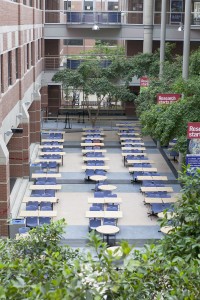Heather’s story: a disenchanted, ‘silent campus’

A former student stopped by my office the other day; classes were over and final examinations had yet to begin.
I remembered Heather well. Every teacher has a small collection of memorable students — students to be recalled warmly during the low periods when university teaching seems to be routinized, cluttered with “administrivia,” bled dry of excitement.
This student came to university the product of a white, upper middle class home, and through our discussions, it was obvious she was reluctantly tearing at these early roots.

Her parents were politically and socially conservative and she now found herself increasingly disturbed by unresponsive federal and provincial governments.
She deplored the public mood of disenchantment with politicians and current government policies. She also deplored the excesses of most of her classmates.
She spoke about how tuition increases as the quality of a university education declined, the problem of increased individual poverty while corporations enjoyed tax-free riches and “corporate welfare” and she was saddened by the desecration of the environment.
Petitions in hand, she worked her way through the dormitories: “It was awful, there wasn’t the slightest interest among students in what was going on in the world, near and far. Some of them showed complete indifference to these problems and they certainly made it clear they didn’t want to listen to me. I came away depressed. I just couldn’t believe such apathy exists.”
She decided such widespread apathy was a function of two things: public disaffection with universities (as evidenced by increasing public demands for educational and financial accountability and general devaluation of the B.A.) and private disenchantment among students regarding their ability to make even a dent in the system.
Heather went on to say that while the majority of young people she knew were never enthralled by politics, now they seem to be sinking even deeper into an apolitical torpor.
The silent majority is growing every day and most of our young have detached themselves from social activism and social criticism.
Heather has some data to support her observations. In a recent survey of university students, when asked to agree or disagree if “there is a real concern among students for social justice, for trying to make the world better,” a mere 27 per cent agreed.
And when asked if “there’s more intellectual activity on this campus than in a good high school,” a mere 40 per cent agreed.
A past editor of The Cord wrote: “There is a noted absence of any spirited quest for knowledge. Critical academic discussion and debate among students is difficult to find outside the obligations of classroom assignments. Essentially, what seems to be missing is the genuine excitement that a university education should inspire.”
As Heather thought about her own future, she said: “Now I am told to honk if I love Jesus. Students dismiss government corruption and abuses of power by saying ‘that’s the way it has always been so why get upset?”
“I see them single-mindedly pursuing grade point averages and worrying about jobs with secure benefits and retirement plans. Whatever happened to a social conscience?”
Heather will continue to work for social justice. She worries that without responsible activism and responsive governments, what few revolutionaries there are may turn into frustrated, mean and dangerous people nourishing a death wish.
At the other extreme, there are students writing about the stock market, sweating grades and honking for Christ.
And I thought to myself, the absence of concern for issues outside the campus community might serve as a behavioral index of psychological adjustment.
The possibility remains that the lack of visible rebellion may even heighten private disillusion and despair.
Nonetheless, I reminded Heather that most students are very pleasant and earnest young people. Perhaps there is flux in the system, and things are in transition.
Maybe a new and idealistic group of young people will grow and shake up the elders once again.
Maybe the excitement of commitment will return to the silent campuses.
Or maybe Heather will exhaust herself, become resigned and buy a house in the “burbs.” I fervently hope not.


